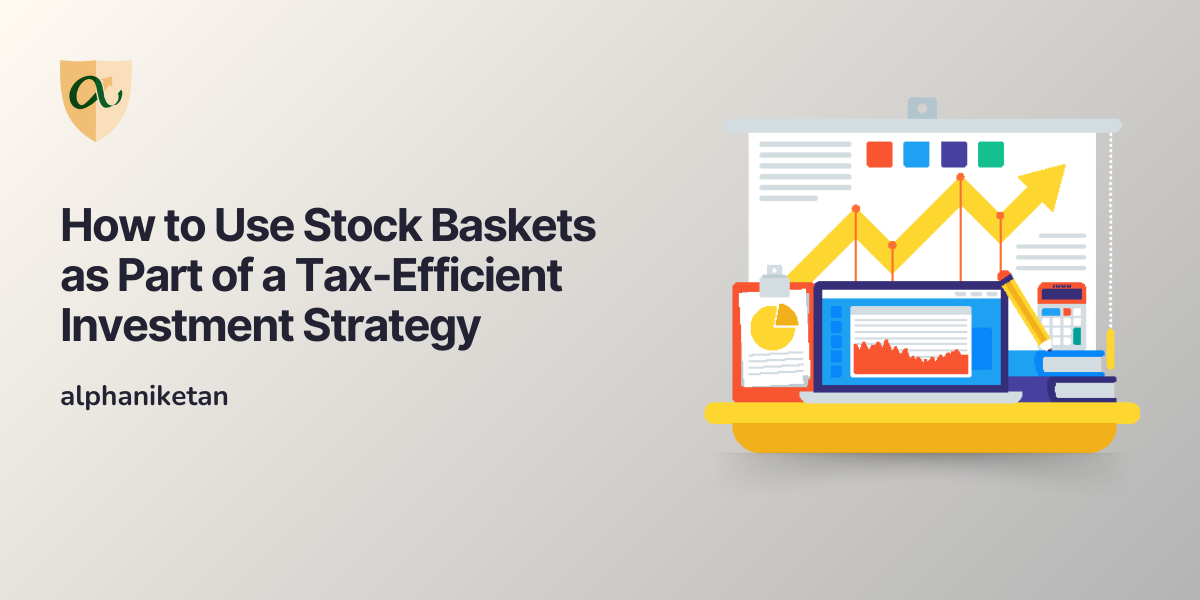Save your taxes by using tax-efficient stock baskets.
Stock baskets are essentially a pre-constructed assortment of equities based on a theme. As a result, similar regulations and taxation principles are relevant when you opt to invest in equities. The taxation of your stock basket investments depends on when you acquire ownership (buy) and transfer ownership (sell).
You obtain ownership in the respective company when you purchase equities or stocks. That makes you a stakeholder in that company. Subsequently, when you divest yourself of the stock, you transfer that ownership. In this scenario, you either realise a profit or incur losses. The tax liability applies solely to the profit portion if you have earned a profit.
If your stock ownership spans less than 12 months in the stock market, tax authorities classify it as a short-term capital gain. Any period exceeding a year falls within the purview of long-term capital gains.
Short-term Capital Gains (STCG) refer to the profits made from selling stocks within a holding period of less than 12 months. These gains are subject to a 15% tax rate but do not apply to losses incurred during the same period.
On the other hand, Long-term Capital Gains (LTCG) pertain to stocks sold after being held for more than 12 months. If the gains from such sales exceed Rs.1,00,000, they are subject to a 10% tax rate.
When you use a stock basket, you can avoid frequent churning of your portfolio. Stock baskets enable you to execute multiple orders at once. It helps save your time as well as brokerage charges. Constantly buying and selling stocks within a short time frame can lead to higher short-term capital gains tax rates.
Adopting a long-term perspective and holding onto your investments for over a year can lead to lower long-term capital gains tax rates. By reducing the frequency of your transactions, you can minimise your tax burden and allow your investments to grow over time, ultimately creating a more tax-efficient and financially rewarding investment strategy.
Stock baskets also help you employ tax loss harvesting strategies. When you use a stock basket, it automatically offsets your capital losses with capital gains. For instance, suppose you own two stocks in a basket: stock A has appreciated significantly, while stock B has incurred a loss. Holding a stock basket offsets the loss incurred by stock B with the gains made in stock A. That reduces your net capital gains and, consequently, your tax liability.
It is important to note that specific rules and limitations are associated with tax loss harvesting, including the requirement to set off capital losses against capital gains within the same fiscal year, with the option to carry forward unused losses for up to eight years to offset future gains.
Regardless of your tax-saving objectives, stock baskets help you to maintain a well-balanced portfolio. Diversification allows you to take advantage of varying tax treatments for different types of income. For example, dividends from equities may be tax-free, while interest income from bonds may be subject to different tax rates.
A balanced portfolio helps manage your risk, potentially reducing the need for frequent trading and minimising capital gains taxes. Periodically rebalancing your portfolio can lock in gains from high-performing assets and potentially offset losses in others, contributing to a more tax-efficient stock basket.
Managing taxes can be overwhelming or complex for you. Seeking advice from a tax advisor can be helpful when using stock baskets. Mistakes or misunderstandings of tax laws can be costlier than consulting fees. Tax regulations can change, and their impact on your investments can be intricate. A tax advisor can tailor your investment strategy to your financial situation and goals, ensuring you make informed decisions while optimising your tax efficiency.
In conclusion, stock baskets are a tax-efficient way to invest in the stock markets. By reducing frequent trading and adopting a long-term approach, stock baskets help minimise short-term capital gains taxes. They also simplify tax loss harvesting by offsetting losses with gains within the basket.
Diversification within baskets optimises varying tax treatments for different income types, while a balanced portfolio minimises risk and the need for frequent trading, reducing capital gains taxes. Consult a tax advisor for a tailored strategy to navigate complex tax laws effectively. With a well-informed approach, you can aim for financial success and peace of mind through stock baskets and investments.
Thank you for reading this post, don't forget to subscribe!




